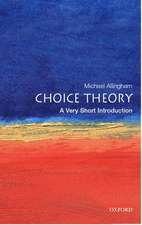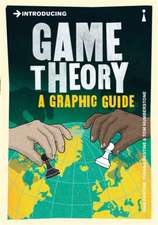Game Theory: Decisions, Interaction and Evolution: Springer Undergraduate Mathematics Series
Autor James N. Webben Limba Engleză Paperback – dec 2006
Din seria Springer Undergraduate Mathematics Series
-
 Preț: 319.90 lei
Preț: 319.90 lei -
 Preț: 237.41 lei
Preț: 237.41 lei -
 Preț: 319.02 lei
Preț: 319.02 lei -
 Preț: 325.20 lei
Preț: 325.20 lei -
 Preț: 238.28 lei
Preț: 238.28 lei -
 Preț: 237.29 lei
Preț: 237.29 lei -
 Preț: 265.92 lei
Preț: 265.92 lei -
 Preț: 236.87 lei
Preț: 236.87 lei -
 Preț: 236.97 lei
Preț: 236.97 lei -
 Preț: 240.63 lei
Preț: 240.63 lei -
 Preț: 237.18 lei
Preț: 237.18 lei -
 Preț: 283.11 lei
Preț: 283.11 lei -
 Preț: 359.15 lei
Preț: 359.15 lei -
 Preț: 358.55 lei
Preț: 358.55 lei -
 Preț: 221.92 lei
Preț: 221.92 lei -
 Preț: 224.54 lei
Preț: 224.54 lei -
 Preț: 358.82 lei
Preț: 358.82 lei -
 Preț: 301.10 lei
Preț: 301.10 lei -
 Preț: 383.17 lei
Preț: 383.17 lei -
 Preț: 229.86 lei
Preț: 229.86 lei -
 Preț: 268.37 lei
Preț: 268.37 lei -
 Preț: 166.75 lei
Preț: 166.75 lei -
 Preț: 239.86 lei
Preț: 239.86 lei -
 Preț: 266.70 lei
Preț: 266.70 lei -
 Preț: 269.99 lei
Preț: 269.99 lei - 15%
 Preț: 526.67 lei
Preț: 526.67 lei -
 Preț: 320.20 lei
Preț: 320.20 lei -
 Preț: 272.49 lei
Preț: 272.49 lei -
 Preț: 272.69 lei
Preț: 272.69 lei -
 Preț: 258.88 lei
Preț: 258.88 lei -
 Preț: 265.83 lei
Preț: 265.83 lei -
 Preț: 265.18 lei
Preț: 265.18 lei -
 Preț: 275.36 lei
Preț: 275.36 lei -
 Preț: 278.24 lei
Preț: 278.24 lei -
 Preț: 266.70 lei
Preț: 266.70 lei -
 Preț: 275.74 lei
Preț: 275.74 lei -
 Preț: 328.08 lei
Preț: 328.08 lei -
 Preț: 265.78 lei
Preț: 265.78 lei -
 Preț: 275.74 lei
Preț: 275.74 lei -
 Preț: 273.45 lei
Preț: 273.45 lei -
 Preț: 277.32 lei
Preț: 277.32 lei -
 Preț: 270.57 lei
Preț: 270.57 lei -
 Preț: 273.63 lei
Preț: 273.63 lei -
 Preț: 270.19 lei
Preț: 270.19 lei -
 Preț: 265.36 lei
Preț: 265.36 lei -
 Preț: 265.36 lei
Preț: 265.36 lei -
 Preț: 268.08 lei
Preț: 268.08 lei -
 Preț: 272.86 lei
Preț: 272.86 lei -
 Preț: 272.69 lei
Preț: 272.69 lei -
 Preț: 271.16 lei
Preț: 271.16 lei
Preț: 256.43 lei
Nou
Puncte Express: 385
Preț estimativ în valută:
49.08€ • 53.33$ • 41.26£
49.08€ • 53.33$ • 41.26£
Carte tipărită la comandă
Livrare economică 17-23 aprilie
Preluare comenzi: 021 569.72.76
Specificații
ISBN-13: 9781846284236
ISBN-10: 1846284236
Pagini: 242
Ilustrații: X, 242 p.
Dimensiuni: 178 x 235 x 20 mm
Greutate: 0.41 kg
Ediția:2007
Editura: SPRINGER LONDON
Colecția Springer
Seria Springer Undergraduate Mathematics Series
Locul publicării:London, United Kingdom
ISBN-10: 1846284236
Pagini: 242
Ilustrații: X, 242 p.
Dimensiuni: 178 x 235 x 20 mm
Greutate: 0.41 kg
Ediția:2007
Editura: SPRINGER LONDON
Colecția Springer
Seria Springer Undergraduate Mathematics Series
Locul publicării:London, United Kingdom
Public țintă
Lower undergraduateCuprins
Decisions.- Simple Decision Models.- Simple Decision Processes.- Markov Decision Processes.- Interaction.- Static Games.- Finite Dynamic Games.- Games with Continuous Strategy Sets.- Infinite Dynamic Games.- Evolution.- Population Games.- Replicator Dynamic.
Recenzii
“This book is an undergraduate textbook devoted to the study of Game Theory to mathematicians. … the book is well written and it is one of the best books as a first course in game theory. The book is focused on mathematics students but it can be easily used to students in other fields such as business, economics and biology. … I strongly recommend this book to the enthusiast of game theory.” (Philosophy, Religion and Science Book Reviews, bookinspections.wordpress.com, June, 2016)
“This is supposed to be a mathematical introduction to game theory for undergraduate students. I think both students of economics and mathematics (both with a course of calculus, linear algebra and optimization in Rn) can use this book. The idea of the book is to provide the ‘intuition’ behind some important theorems of game theory.” (Philosophy, Religion and Science Book Reviews, bookinspections.wordpress.com, March, 2014)
"A single-semester elective course in game theory would be an attractive feature of any undergraduate mathematics program. Students would get to use the various mathematical skills they have acquired in a thought-provoking applied context. The book under review is intended as a textbook for such a course. … Certainly the choice of topics and overall organization is good." (David P. Roberts, MathDL, August, 2007)
“This is supposed to be a mathematical introduction to game theory for undergraduate students. I think both students of economics and mathematics (both with a course of calculus, linear algebra and optimization in Rn) can use this book. The idea of the book is to provide the ‘intuition’ behind some important theorems of game theory.” (Philosophy, Religion and Science Book Reviews, bookinspections.wordpress.com, March, 2014)
"A single-semester elective course in game theory would be an attractive feature of any undergraduate mathematics program. Students would get to use the various mathematical skills they have acquired in a thought-provoking applied context. The book under review is intended as a textbook for such a course. … Certainly the choice of topics and overall organization is good." (David P. Roberts, MathDL, August, 2007)
Notă biografică
James Webb is a former lecturer at Nottingham Trent University, UK
Textul de pe ultima copertă
This introduction to game theory is written from a mathematical perspective. Its primary purpose is to be a first course for undergraduate students of mathematics, but it also contains material which will be of interest to advanced students or researchers in biology and economics.
The outstanding feature of the book is that it provides a unified account of three types of decision problem:
The outstanding feature of the book is that it provides a unified account of three types of decision problem:
- Situations involving a single decision-maker: in which a sequence of choices is to be made in "a game against nature". This introduces the basic ideas of optimality and decision processes.
- Classical game theory: in which the interactions of two or more decision-makers are considered. This leads to the concept of the Nash equilibrium.
- Evolutionary game theory: in which the changing structure of a population of interacting decision makers is considered. This leads to the ideas of evolutionarily stable strategies and replicator dynamics.
Caracteristici
Provides three books in one: it covers the basic ideas of decision theory, classical game theory; and evolutionary game theory in one volume No background knowledge of economics or biology is required: examples have been carefully selected to be accessible to readers unfamiliar with these subjects Detailed solutions to the numerous exercises are provided at the back of the book, making it ideal for self-study












